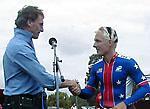
Recently on Cyclingnews.com |
Introduction to Track Racing - What's a Wheelrace? - Introduction to Six Day racing - UCI codes
Tasmanian Christmas Carnivals
Australia, December 26, 2002-January 1, 2003
Preview
By Rod Morris
 |
The 2002-03 Tasmanian Christmas Carnivals, sponsored by Telstra Country Wide, is a hugely popular five-event series of track carnivals held over the Christmas and New Year period in the Australian 'island state' of Tasmania. In addition to the well known Latrobe, Launceston, Devonport and Burnie carnivals, the series also features a 72 km criterium in Launceston, held on December 27. The Launceston Criterium, sandwiched between the Boxing Day Latrobe and Silverdome indoor Carnivals, boasts $20,000 prizemoney for the two hour event, which has already attracted some of the country's best known riders. Many of the competitors will also contest the time honoured Tasmanian Christmas Carnivals.
This season's Carnivals series include the following:
December 26 - Latrobe Carnival.Full
results, reports and and photos
December 27 - Launceston
Criterium Full results, reports and and photos
December 28 - Launceston Carnival
(Silverdome) Full results, reports and and photos
December 29-30 - Devonport Carnival
Full results, reports and and photos
January 1 - Burnie Carnival - washed out due to rain
January 5 - Hobart Carnival Full
results, reports and and photos
January 11 - Mersey Valley-Devonport
Cycling Club Carnival Full results, reports and and photos
January 18 - St Helens Carnival
Full results, reports and and photos
SCAT's website is www.tascarnivals.com, which now has the ability for competitors to enter online.
What's a Wheelrace?
The premier events during the Tasmanian Christmas Carnivals are the Wheelraces for men and women, as well as the 200-lap Madison (only held at the Launceston Silverdome). The Wheelraces are an Australian tradition and although non-championship events, they are always keenly contested as they have the greatest amount of prize money on offer.
A wheelrace is a handicap event open to a wide range of riders. The race distance is typically 2000 metres if it's held in an indoor velodrome, or 3000 metres if it's an outdoor track. Riders start from a variety of positions around the track, with their handicap (or position) based on current grading and past performances. The top riders start from the 'scratch mark' - which is the absolute race distance - but they are sometimes over 300 metres behind the first riders who have that much less distance to travel. The scratch riders are thus the only ones who have to cover the entire race distance.
With 'head starts' provided to the majority of the field, it is always possible that the front and middle markers can get organised and work together to hold off the highly-fancied 'scratch' riders. While some see this as unfair, it's an entrenched part of the sport and gives riders of all abilities to compete against the stars, with a theoretically even chance to win.
